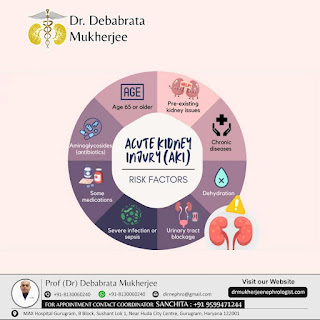Causes of damage to kidney
- Get link
- X
- Other Apps
The kidneys play a crucial role in filtering and eliminating waste products and excess fluids from the body. Various factors can contribute to kidney damage, and it's essential to address these factors to prevent or manage kidney disease. Some common causes of kidney damage include:
Hypertension (High Blood Pressure): Persistent high blood pressure can damage the blood vessels in the kidneys, reducing their ability to function properly over time.
Diabetes: Diabetes is a leading cause of kidney disease. High levels of blood sugar over time can damage the kidneys' filtering units (glomeruli).
Infections: Infections, especially urinary tract infections (UTIs) that spread to the kidneys, can cause damage. Chronic kidney infections may lead to scarring and impaired kidney function.
Autoimmune Diseases: Conditions like lupus and other autoimmune disorders can affect the kidneys by causing inflammation and damage to the filtering units.
Genetic Factors: Some people may inherit genetic conditions that make them more susceptible to kidney disease. Polycystic kidney disease (PKD) is an example of a genetic disorder that can lead to kidney damage.
Obstruction of Urinary Tract: Conditions such as kidney stones, tumors, or an enlarged prostate can block the flow of urine, leading to kidney damage over time.
Certain Medications: Long-term use of certain medications, including some antibiotics, nonsteroidal anti-inflammatory drugs (NSAIDs), and certain blood pressure medications, can cause kidney damage.
Toxic Exposures: Exposure to certain toxins, such as heavy metals, solvents, and certain drugs, can harm the kidneys.
Dehydration: Insufficient water intake can concentrate urine and contribute to the formation of kidney stones, potentially leading to kidney damage.
Age: Aging itself can lead to a gradual decline in kidney function. It's a natural part of the aging process, but certain lifestyle factors can exacerbate this decline.
Smoking: Smoking has been linked to an increased risk of kidney damage and may worsen existing kidney conditions.
Excessive Alcohol Consumption: Heavy and prolonged alcohol use can contribute to kidney damage.
It's important to note that early stages of kidney disease may not always cause noticeable symptoms. Regular check-ups and monitoring of risk factors are essential for early detection and intervention. Lifestyle modifications, such as maintaining a healthy diet, staying hydrated, managing blood pressure and diabetes, and avoiding excessive use of medications or substances that can harm the kidneys, can help prevent or slow down the progression of kidney damage. If you have concerns about your kidney health, it's advisable to consult with a healthcare professional,
Visit : https://drmukherjeenephrologist.com/
Get in touch with us
-
E-mail
dirnephro@gmail.com -
Phone No.
011-47095170, +91-9810571808
WhatsApp
https://www.youtube.com/channel/UCQ1xylejZdU2u2qyLUduCKw
- Get link
- X
- Other Apps


Comments
Post a Comment